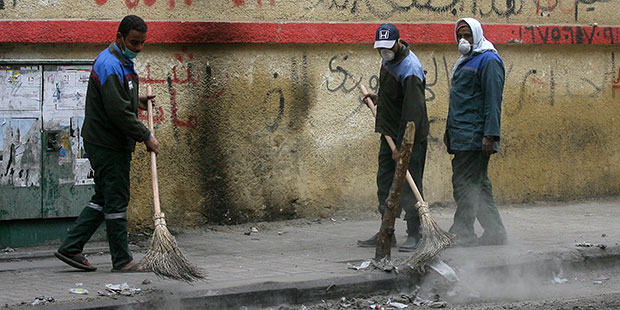Children and families smile and dance as they listen to a band on the platforms of the Attaba subway station in a recent ad campaign urging Egyptians to sort their refuse at home. The musicians play on instruments made out of repurposed household items, and the end of the 30-second spot ends with the message “waste separation = clean environment.”
Household refuse sorting, the target of the campaign, may help local trash collectors, but Egypt has no centralized garbage collection system, and most refuse all goes to the same dumps. Egypt, which produces an estimated 40 of tons of trash a day according to a World Bank report in 2012, and where trash is casually thrown on streets, has chronically struggled with its waste management.
In December 2013 the Ministry of Environment launched a national campaign to improve the solid waste management system that is based on a radical overhaul in the system of collecting, transporting and recycling Cairo’s enormous amount of garbage.
“Separating waste from the source” campaign aims to develop new mechanisms of collecting wastes from houses by separating it into two main components: organic wastes and solid waste. The campaign started with a pilot project in Giza’s northern district of Dokki , and is scheduled to cover other nearby districts of Agouza and Mohandessin, according to head of the project Ahmed Saaed.
There has been no formal framework or strategic planning in the waste disposal sector and responsibilities and tasks are not clearly allocated, Minister of Environment Laila Iskander has stated. The sector is significantly underfinanced and has an enormous need for long-term investments, she said a TV interview in November 2013.
Garbage collection in Cairo until 1950′s was mostly done informally by a group of rural-urban migrants living in an area northeast of Cairo called Zabaleen, named for its residents, literally “garbage people.” Due to the increase in Egypt’s population and the consequent service expansion, the Ministry of Environment contracted in 1990’s local and international companies to collect transport and recycle solid waste.
“Garbage collectors separated the garbage in Zabaleen , feeding pigs with the organic waste and selling the solid waste to recycling companies,” said Saeed, adding that the companies have not used enough garbage bins to cover demand, and have been overloaded with garbage. Cairo alone produces over 8 tons a day, he added.
A dispute over financial issues occurred between the government and the international companies and led to the termination of the signed contract in 2013, thus the Ministry of Environment launched the said campaign and signed contracts with over 150 local companies.
Cairo districts have been divided into smaller units in order to facilitate the garbage collection and enhance accountability, said Saeed, who pointed out that separating waste will make it easier to collect, transport and recycle.
Wasted potential
Only 60 per cent of the waste produced in Cairo is collected, of which less than 15 per cent is properly recycled or reused, according to GIZ, a German corporation contracted by the Egyptian government to assist in waste management. A big portion of the waste is released untreated into canals, rivers or streets and open areas which caused a burden on water, soil and air, as well as having a negative impact on the economy and tourism.
According to a 2011 report of the World Bank, Egypt loses 0.4-0.6 percent of its GPD due to the inefficiency of solid waste policies. The report also said that Egypt recycles 13-15 percent of its yearly waste through the informal sector and the recent project aims at formalizing the waste system.
“The bill of recycling Egypt’s garbage is an estimated at 3 billion EGP ($430 million) every year and the campaign aims to minimizing the cost by getting the best use of the organic waste through using it as land fertilizers and recycle the other solid waste,” said Saeed.
“Several residents of Dokki district praised the campaign and cooperated with us,” said Abdel Tawab Shaker, a garbage collector who added that the TV advertisements played a good role in raising the public awareness of people.
Samya Shahed, a Dokki resident told The Cairo Post that the garbage collectors have been punctual and that they have provided her with two sacks of plastic bags; green one for organic waste and black ones for solid waste.
There are around major 40 dumpsites in Greater Cairo, said Ahmed Saeed.
“In Giza, there is one down the ring road in Al Marioutia Canal and another one under the ring road in Al Mounib district while Cairo’s biggest dumpsite is located at the city’s northern district of Al Marg,” said Saeed.
Zabaleen
Most of the Zabaleen are the descendents of farmers who migrated from Upper Egypt to Cairo in 1940’s and kept their traditional work of raising pigs, goats and chicken at home. They mixed with other tribes from the oasis named Wahiya who also immigrated to Cairo in the 1920s and worked in collecting the city’s household waste.
Later on, the Zabaleen were tasked with collecting and sorting the waste; women and girls in the Zabaleen community sorted the garbage at homes into different types; glass, papers, metals, etc., and sold them to other families or companies while the organic waste was used as food for their domesticated animals.
The Zabaleen community, estimated at 55,000 inhabitants, are now settled under the cliffs of Moqattam Mountain.
The community was hit hard in 2009, when the Ministry of Health slaughtered nearly all of their pigs in reaction to public fears about the spread of swine flu, effectively ending the most common means to manage organic waste.
In the newly launched campaign of separating waste from the source, Zabaleen are tasked to still perform garbage collection, but will not take the organic waste.

